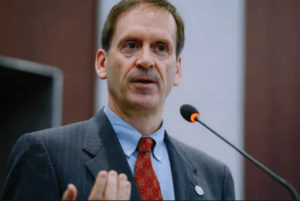by WorldTribune Staff, September 3, 2017
The Trump administration on Aug. 29 raised concerns over Sudan’s persecution of religious minorities during talks aimed at easing sanctions on Khartoum which have been in place for 20 years.
Mark Green, newly-appointed head of the U.S. Agency for International Development (USAID), held the talks with senior Sudanese officials as the U.S. government weighs whether to ease or extend the economic sanctions, a decision that must be made by Oct. 12, Reuters reported.

During the recent unveiling of the U.S. State Department’s latest religious freedom report, Secretary of State Rex Tillerson called out Sudan for arresting or intimidating Christian clergy and church members, and for demolishing churches and attempting to close church schools.
Green said if Sudan complied with U.S. demands for the lifting of the sanctions, and protected religious freedom, “it would bring in a new era for a new relationship in which many issues can be taken on.”
“We have asked questions and … have received assurances,” Green told reporters after a meeting with Sudanese Prime Minister Bakri Hassan Saleh.
During his three-day visit to Sudan – the first by a senior U.S. government official since 2005 – Green met with various religious organizations, including churches and religious freedom lawyers.
The Sudanese government “is continuing a gradual reversal of long-standing impediments,” Green said, “and I urge the government to accelerate its work in this regard.”
Sudanese Foreign Minister Ibrahim Ghandour said his country was looking forward to normal ties being restored.
“On our side we look forward for a normalization of our relations with an important country … the U.S.,” said Ghandour, who has overseen dialogue with Washington on the sanctions.
Easing the sanctions could suspend a trade embargo, unfreeze assets and remove financial restrictions that have exacted a heavy toll from the Sudanese economy.
The lifting of sanctions could enable Khartoum to regain access to the global banking system, unlocking much-needed trade and foreign investment. Sudan has an inflation rate of 35 percent and a shortage of foreign currency has crippled its ability to buy abroad.
Lifting the sanctions would be a major victory for the government of Sudanese President Omar Bashir, who once played host to Osama bin Laden and is wanted by the International Criminal Court (ICC) on charges of orchestrating genocide in Darfur.
Washington has not weakened its condemnation of Sudan’s tactics in Darfur, and Sudan remains on the U.S. list of state sponsors of terrorism, alongside Iran and Syria.
The United States first imposed sanctions on Sudan in 1997, including a trade embargo and blocking the government’s assets, for human rights violations and terrorism concerns.
The U.S. added more sanctions in 2006 for what it said was complicity in the violence in Darfur.
Subscribe to Geostrategy-Direct __________ Support Free Press Foundation
